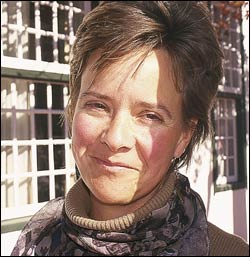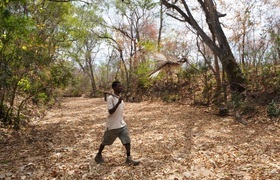PhD reflects on how student performance is evaluated
17 June 2003
Passing sentence: CHED staff member, Suellen Shay, will receive her PhD on June 20.
It is important that academics critically reflect on their own practices, especially when it comes to the assessment of students' performance. This according to Suellen Shay, Co-ordinator of the Higher Education Studies Programme at the Centre for Higher Education Development (CHED), who will be receiving her PhD on the subject on June 20.
A strong interest in educational practices that facilitate a positive learning experience for students led Shay to question just what it was that caused agreement or disagreement between assessors when judging students' work.
"I became particularly interested in the phenomenon when I was working at UCT's Writing Centre," said Shay. "When pieces of writing were assessed it was not uncommon to find disagreement among staff as to what value to attribute to the student's work," she added.
Shay started her research in 1997 with a pilot study and thereafter looked at two case studies involving different disciplinary communities of practice. The case studies involved academics' assessment of major research projects, which were required of undergraduate students in their final year.
According to Shay, assessment is a socially situated interpretative act, where a variety of issues inform the assessors' judgment, not least of which is the assessor's interaction with a student over a period of time. The supervisor is often not only assessing a product, but also a person and a process.
For Shay, assessment is a sensitive issue but the myth that it takes place in a "neutral and clinical fashion" must be dispelled. "Even where the assessment criteria have been explicitly spelt out, there are always implicit criteria which shape the judgement, especially the higher you move up the postgraduate level," she said.
"In the assessment judgement a particular value system is being applied which acts as a filter. The problem is that in academe we are not very good at talking about these values and when we do, it is often brought up in an emotionally charged environment.
"I hope my research will facilitate a process whereby these value systems, which operate in higher education institutions and in disciplinary communities of practice, become more transparent," she added.
For this mother of three young daughters, the endless slog of her PhD might have come to an end, but Shay hopes to continue her research and look at ethical considerations which impact on assessment.
"I have a strong sense that there are hidden ethical issues out there that need to be brought to the surface," she affirmed.
Asked how she managed a full-time academic career with PhD studies and the demands of a family, Shay replied: "It's all about balance and planning. I have a fantastic support system of family and colleagues. I couldn't have done it without them."
 This work is licensed under a Creative Commons Attribution-NoDerivatives 4.0 International License.
This work is licensed under a Creative Commons Attribution-NoDerivatives 4.0 International License.
Please view the republishing articles page for more information.
Related
Crime in the age of algorithms
22 Jan 2026










